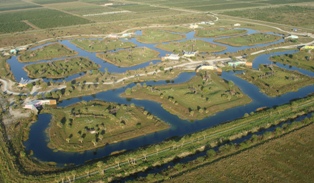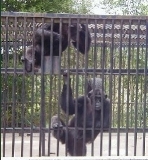Like many of our supporters, Save the Chimps was shocked to learn of the tragic situation in Zanesville, OH. Although no chimpanzees were involved, we were still horrified and deeply saddened by this turn of events. An individual who owned a multitude of exotic animals, including monkeys, bears, tigers, and lions, released the animals from their enclosures, and then committed suicide. Law enforcement officers had little choice but to shoot most of the animals.
Unfortunately, sanctuaries that provide high quality, lifetime care to rescued animals are sometimes lumped into the same category as exotic animal collectors, breeders, and pet owners. Exotic animal collectors or breeders may even refer to themselves as a sanctuary or preserve, when they share little in common with a true sanctuary. How can the public tell the difference?
There are, fortunately, several distinctions. A sanctuary such as Save the Chimps never buys, sells, rents, exhibits, or deliberately breeds animals. Sanctuaries provide safe, secure  housing, and provide care that well exceeds minimum animal welfare standards. Sanctuaries welcome oversight—including a board of directors, as well as regular state and federal inspections—to ensure compliance with the law. Safety is paramount, and emergency plans are in place. For example, at Save the Chimps there are multiple locks on each chimpanzee door, and multiple staff members check each and every lock every single day. STC also has protocols that must be followed in the unlikely event of an escape, maintains recapture equipment kits, conducts drills, and has a cooperative relationship with local law enforcement.
housing, and provide care that well exceeds minimum animal welfare standards. Sanctuaries welcome oversight—including a board of directors, as well as regular state and federal inspections—to ensure compliance with the law. Safety is paramount, and emergency plans are in place. For example, at Save the Chimps there are multiple locks on each chimpanzee door, and multiple staff members check each and every lock every single day. STC also has protocols that must be followed in the unlikely event of an escape, maintains recapture equipment kits, conducts drills, and has a cooperative relationship with local law enforcement.
In order to further help define the standards that distinguish sanctuaries from collectors, roadside zoos, and exotic animal trainers, a group of chimpanzee sanctuaries, including Save the Chimps, founded the North American Primate Sanctuary Alliance (NAPSA). Working cooperatively with each other and animal welfare organizations, NAPSA will establish criteria for quality primate care and assist the public in easily identifying those organizations that truly provide sanctuary.
The horrible case in Ohio further illustrates why non-domesticated animals such as big  cats, monkeys, chimps, bears and other wildlife do not make good pets. The breeding and sale of these magnificent beings should be prohibited by law, and no one should be permitted to keep them as pets. We hope that stronger regulations will be put into place in Ohio and elsewhere as a result of this situation, but it is tragic that the cats, bears, and monkeys had to pay for human failings with their lives.
cats, monkeys, chimps, bears and other wildlife do not make good pets. The breeding and sale of these magnificent beings should be prohibited by law, and no one should be permitted to keep them as pets. We hope that stronger regulations will be put into place in Ohio and elsewhere as a result of this situation, but it is tragic that the cats, bears, and monkeys had to pay for human failings with their lives.
 |

